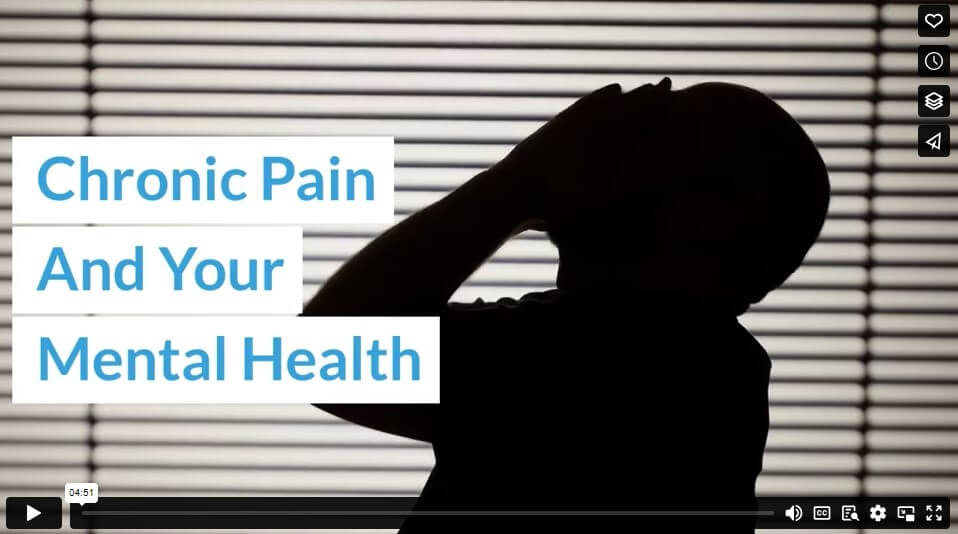You lie in bed staring at the darkened ceiling. The alarm clock says it’s 3:30 in the morning, but you aren’t going to sleep. Peripheral neuropathy, or damaged nerves in your limbs, is causing hypersensitivity in your feet. The mattress hurts under your heel, the weight of the blanket hurts your toes, and cramping makes your legs jump. You try not to wake your partner, hoping the pain medicine kicks in soon.
It’s been weeks since you’ve had a good night’s sleep. What if they can’t figure out how to stop the pain? What if this is your new normal? “What ifs” swirl in your mind as you lie in the dark, and depression creeps in, settling in your chest, a weight that never seems to disappear.
It’s not much better during the day, either. It’s been impossible to focus at work. Your feet have been numb, and you stumbled over the carpet in front of your boss. It’s getting harder to grip things, and walking feels like slogging through mud. Everything seems more complicated, and even simple tasks take longer than they used to. Your eyes burn, and you nod off every time you sit down, but something about the night worsens it.
The Link
Chronic pain, like neuropathy, and mental illness, such as depression, go hand in hand, but the problem is more complex than you realize.
Unrelenting pain will cause depression, especially when a person is unaccustomed to it. Everyday tasks become more difficult, perhaps even impossible. Independent adults may be unable to dress, cook, or drive for themselves. They may lose their job and experience stress-related turbulence in their relationships. Repeated doctor visits can be costly.
Yet mental illness can also cause chronic pain. Symptoms may come slowly or suddenly without an apparent cause. The constant barrage of stress hormones can lower your immune system, causing migraines, systemic inflammation, and even autoimmune disorders. Sometimes, it’s unclear which condition caused the other.
The Problem
Most patients will only talk about the physical symptoms. The contributing mental illness (PTSD, bipolar disorder, anxiety disorder, clinical depression, etc.) often goes undiagnosed and untreated. Whether it was the first condition to present itself or a symptom of another diagnosis, it will complicate treatment.
The Solutions
- Discuss All Your Symptoms – Even if you think they are unrelated, tell your doctor about physical and mental symptoms you are experiencing. Your doctor will better understand your overall health and may see a pattern or connection you do not. If your symptoms change before or after treatment, tell your doctor so they know what’s working and what is not. You don’t want your pain to get better but your depression to get worse. (Or vice versa.)
- Talk to a Therapist – If you have feelings of sadness, anxiety, irritability, aggression, hopelessness, or guilt, a therapist specializing in patients with chronic illness or pain can help you sort out what is natural, such as a grieving process to mourn what was lost, and what is dangerous, such as suicidal thoughts or apathy. Healthy emotional expression may be easier in a private and confidential environment with a stranger than with family and friends.
- Reduce Your Stress – Stress reduction techniques help with both conditions. They can lower stress hormones, increase serotonin and dopamine levels, and help you control your thoughts.
- Deep, slow breaths trick your body into thinking the stress is gone, and it will regulate your stress hormones.
- Yoga and other physical meditations focus on movement and breath. In addition to the physical benefits of stretching and gentle strength training, it can let your mind rest rather than focus on your worries.
- Try mindfulness and meditation, any activity you enjoy that requires total concentration.
- Fight Inflammation – Try an anti-inflammatory diet to help your system regain its calm. Avoid processed foods, grains, sugars, dairy, and red meat. Eat plenty of whole fruits and vegetables, which can replenish neurotransmitters and help your body heal as much as possible. This diet is also close to a diabetic diet. By focusing on whole foods low on the glycemic index, diabetic neuropathy will improve. Caught early enough, it may even reverse the damage to the nerves.
- Try Supplements – Some vitamins and nutritional supplements can improve nerve function and regeneration, especially if your body is deficient. Consider which ones might help improve your overall health and nerve function.
Treating the whole person rather than an isolated symptom is always more effective. Sometimes, it takes multiple approaches to find the balance of physical and emotional health that improves your quality of life. Your physical and mental health is worth the effort. Keep pushing forward until you find a solution that works for you.
DISCLAIMER: THIS ARTICLE DOES NOT PROVIDE MEDICAL ADVICE
The information, including but not limited to texts, graphics, images, and other material contained in this article, are for informational purposes only. None of the material mentioned is intended to be a substitute for professional medical advice, diagnosis, or treatment. Always seek the advice of your physician or other qualified healthcare provider with any questions you may have regarding a medical condition or treatment before undertaking a new care regimen. Never disregard professional medical advice or delay in seeking it because of something you have read in this article.
Video

Infographic
Chronic pain and mental illness often coexist, but mental health issues such as PTSD, bipolar disorder, anxiety disorder, and clinical depression often go undiagnosed and untreated. Find out more about managing chronic pain and mental health in this infographic.

